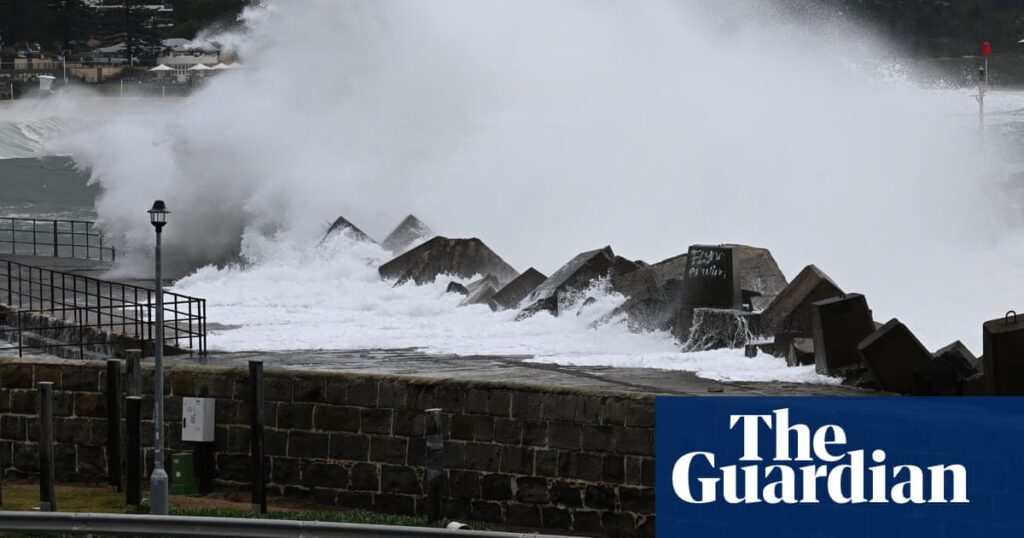Water flowing out of Australia’s largest urban water supply will add to the risk of flooding after a damaging and complex low-pressure system continues to cause widespread havoc across New South Wales and eastern Victoria.
Severe weather warnings for damaging winds and hazardous surf remained in place on Thursday morning, with the system still “lurking over the Tasman Sea”, said Helen Reid, meteorologist at the Bureau of Meteorology.
Several places had received more than 200mm of rain in recent days. On the NSW south coast, Morton received 276mm, Currarong 252mm Ulladulla 240mm and Jervis Bay 217mm in the 48 hours to 8am Thursday.
Warragamba Dam, west of Sydney, began to spill at around 10.35pm on Wednesday after days of heavy rain, WaterNSW said.
“The duration and volume of the spill will ultimately be determined by rainfall received across the catchment,” it said.
In NSW, minor to moderate flood warnings were in place for the St Georges Basin, Hawkesbury, Shoalhaven, Peel and Snowy Rivers on Thursday morning.
Heavy rainfall had also drenched catchments across east Gippsland, in Victoria. Major flood warnings were in place for the Mitchell, Cann and Genoa rivers, and minor flood warnings for the Snowy, Tambo and Avon rivers.
The NSW State Emergency Service has responded to more than 3,800 incidents during the complex weather system. The majority of incidents have involved fallen trees and powerlines, damage to properties and vehicles, and 10 flood rescues.
More than 2,000 volunteers and emergency services have been involved in the response.
Additional crews from the ACT joined response and recovery efforts late on Wednesday.
The NSW SES deputy commissioner, Debbie Platz, told the ABC that volunteers had responded to a “staggering amount” of incidents, and the situation was “still a moving feast”.
“Just overnight, 1400 jobs came in, and predominantly those are in the metropolitan Sydney area and then the south coast, and following that, the mid north coast area.”
We have seen with these high winds, a lot of projectiles flying around – so trampolines and outdoor furniture that haven’t been tied down, but also trees that are coming down on properties and vehicles, and of course, power lines that have come down as well.”
About 5,800 customers remained without power at 9am Thursday, according to network operators Ausgrid, Endeavour Energy and Essential Energy, down from a peak of 37,000.
after newsletter promotion
The downpours formed part of a “vigorous” east coast low the Bureau of Meteorology predicted would move into the Tasman Sea.
Lord Howe Island residents were warned to prepare for increased winds and elevated seas, with waves up above five metres.
Damaging winds with gusts up to 100km/h were expected to continue through the morning around parts of northern NSW.
Dozens of properties were under evacuation warnings due to flooding at Burrill Lake and Sanctuary Point near Jervis Bay.
In nearby Sussex Inlet, Fay Brown was stranded when roads approaching the Badgee Bridge flooded.
Without a four-wheel drive, Brown would have used a flood access road, but the local council continued a longstanding practice of blocking the road rather than allowing residential access.
“This happens every time we have heavy days of rain. I’ve lived here 11 years and been stuck on at least five occasions,” she said. “Once we were stuck there for four days.”


